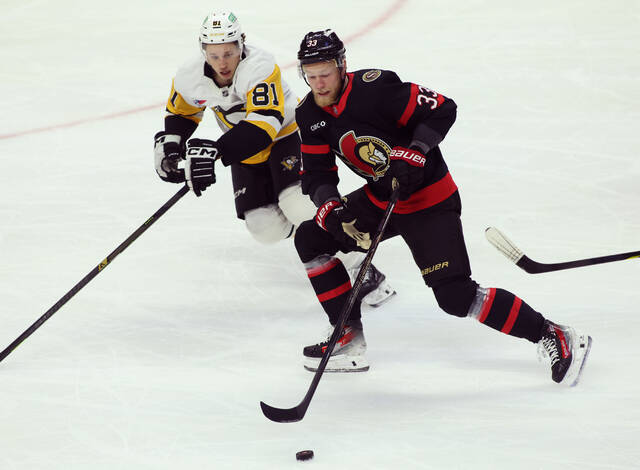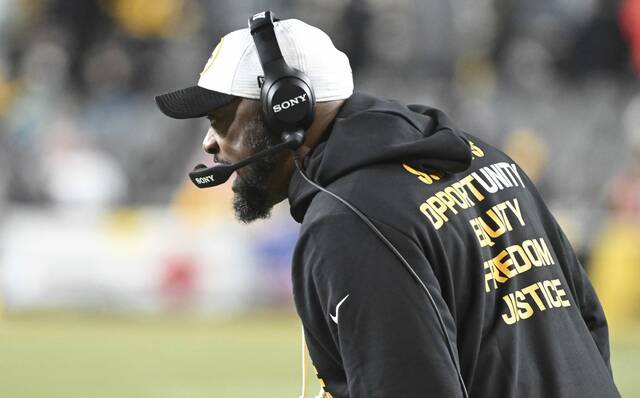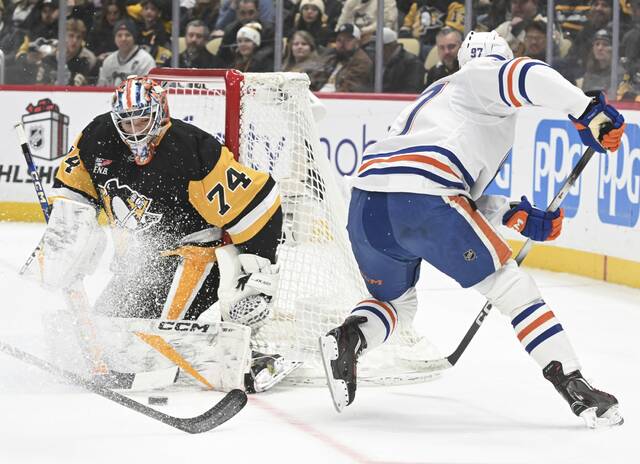A major reason the Pittsburgh Penguins signed forward Brock McGinn to a four-year contract this past offseason was his physical game.
He is a steady checker, as evidenced by the 84 hits he has been credited with, fifth-most on the roster. Combined with linemate Zach Aston-Reese’s team-leading 174 hits, the Penguins’ fourth line of Aston-Reese, Teddy Blueger and McGinn have a pretty defined identity.
But do the number of hits mean anything to McGinn? After all, his penchant for physical play is why he earned a contract that carries a healthy salary cap hit of $2.75 million.
“You don’t really think about how many hits,” McGinn said. “It’s just about going out there and playing a physical game. When you do that, it creates space for your linemates. When our line does that, I think that’s when we start rolling around in the offensive zone and we start getting our chances.”
Entering Wednesday, the Penguins were among the NHL leaders in hits with 1,486, fifth-most in the league.
For a squad that often is critiqued externally as not being physical enough, that figure would appear to dispel that label typically affixed to the Penguins.
But there is one prominent voice that argues against any validity that tabulation carries.
Mike Sullivan’s.
“I don’t have a lot of faith in who’s tracking those numbers,” the Penguins coach said. “Hits is such a subjective number depending on what building you go to. Some guys think incidental contact is a body check. Other buildings are the opposite. It’s hard to trust that statistic because there is so much subjectivity associated with it. So we don’t hold a lot of credence in it.”
That’s not to say Sullivan and the Penguins don’t value hits. But they certainly don’t value the number of hits they — or any other team — are credited with by NHL stat crews.
As suggested not-so-subtly by Sullivan, the standard for what is considered a hit can vary from building to building. In 29 home games this season, the Penguins have recorded 854 hits, equating to 28.85 hits per 60 minutes.
Conversely, in 29 road contests, they have been credited with only 631 hits, the equivalent of 21.56 hits per 60 minutes.
So how the Penguins view their identity isn’t based on any kind of hard metric, at least not one that is rooted in physical play.
“We want to be a team that’s hard to play against,” Sullivan said. “Part of that is physical play. We want to make sure that we’re using our bodies to separate (opponents) from the puck to be hard to play against in the battle areas. It’s always an interesting conversation because sometimes (media) point to a team getting outhit or whatever that might be. My initial thought to that comment is if someone is making an awful lot of body checks, they probably don’t have the puck.
“There’s a fine line there. We want to be hard to play against. We want to be a team that has a physical element to their game. But we certainly want to be a team that has the puck. But I wouldn’t hold a lot of credence in that statistic.”
Sullivan definitely doesn’t buy into the longstanding perception that his team isn’t physical enough.
“I’m not sure where that longstanding perception is,” Sullivan said. “This team has had an awful lot of success. My opinion is this team is built a certain way, to play the game a certain way. And they’ve embraced that style and they’ve had a lot of success doing that. You can define physicality a number of different ways. I would argue this group of players — especially the core players that have been here for quite some time now — is as tough a group as I’ve been around. … The biggest way we define it is being hard on pucks and making sure that we win puck battles and things of that nature. We’ve got some of the stiffest players in that regard. (Forward Sidney Crosby) personifies it, for example.
“A willingness to play through physicality is, for me, another example of toughness. When you look at our defensemen, for example, that go back for pucks and take hits to make plays and help us get our of our end zone, regardless of how teams try to play against us. They go back for pucks undeterred with the same conviction. The physicality that teams try to use to play against us doesn’t change the gameplan, doesn’t change the mindset that this group of players has. They understand they have to play through stuff if we’re going to have success. I’m not sure where that ‘longstanding perception’ is, but I would argue against it.”
Notes: Penguins rookie forward Kasper Bjorkqvist was assigned to Wilkes-Barre/Scranton of the American Hockey League. … The Penguins had a scheduled day off Wednesday.








